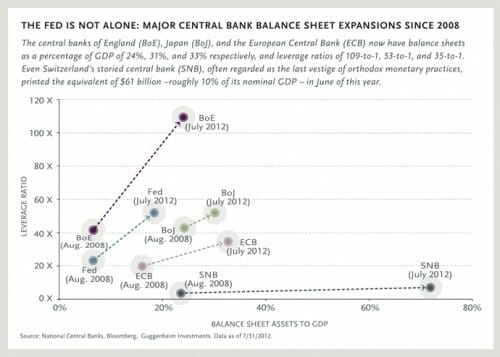By this definition of "not normal", I am not normal either. I share with Tabarrok the strong sense that the New Deal (combined with shockingly stupid use of Wilson's Federal Reserve and of course rampant scorched-earth protectionism) extended rather than shortened the Great Depression.
Imagine, increasing the power of
unions to strike and raise wages during a time of mass strikes and mass
unemployment. Imagine thinking that cartelizing whole industries
thereby raising prices and reducing output could improve the economy.
Not everything Roosevelt did was counterproductive - he did end
prohibition (although in order to raise taxes) - but plenty was and
worst of all was the uncertainty created by Roosevelt's vicious attacks
on business.
One of the things I think we have done historically is understate the true degree to which Roosevelt showed himself willing to take the country down the road to socialism, or more accurately, Mussolini-style fascism. Via David Gordon:
Roosevelt never had much
use for Hitler, but Mussolini was another matter. "'I don't mind
telling you in confidence,' FDR remarked to a White House
correspondent, 'that I am keeping in fairly close touch with that
admirable Italian gentleman'" (p. 31). Rexford Tugwell, a leading
adviser to the president, had difficulty containing his enthusiasm for
Mussolini's program to modernize Italy: "It's the cleanest "¦ most
efficiently operating piece of social machinery I've ever seen. It
makes me envious" (p. 32, quoting Tugwell).
Why did these
contemporaries sees an affinity between Roosevelt and the two leading
European dictators, while most people today view them as polar
opposites? People read history backwards: they project the fierce
antagonisms of World War II, when America battled the Axis, to an
earlier period. At the time, what impressed many observers, including
as we have seen the principal actors themselves, was a new style of
leadership common to America, Germany, and Italy.
Once more we must avoid a
common misconception. Because of the ruthless crimes of Hitler and his
Italian ally, it is mistakenly assumed that the dictators were for the
most part hated and feared by the people they ruled. Quite the
contrary, they were in those pre-war years the objects of considerable
adulation. A leader who embodied the spirit of the people had
superseded the old bureaucratic apparatus of government.
If you don't believe me, it is probably because you are not familiar with the National Recover Act (NRA) -- the famous "blue eagle". This program was the very heart of Roosevelt's vision for the American economy, a vision of cartelized industries managed by government planners. (via Sheldon Richman of the Concise Encyclopedia of Economics):
The image of a strong
leader taking direct charge of an economy during hard times fascinated
observers abroad. Italy was one of the places that Franklin Roosevelt
looked to for ideas in 1933. Roosevelt's National Recovery Act (NRA)
attempted to cartelize the American economy just as Mussolini had
cartelized Italy's. Under the NRA Roosevelt established industry-wide
boards with the power to set and enforce prices, wages, and other terms
of employment, production, and distribution for all companies in an
industry. Through the Agricultural Adjustment Act the government
exercised similar control over farmers. Interestingly, Mussolini viewed
Roosevelt's New Deal as "boldly... interventionist in the field of
economics." Hitler's nazism also shared many features with Italian
fascism, including the syndicalist front. Nazism, too, featured
complete government control of industry, agriculture, finance, and
investment.
And further, from John Flynn's The Roosevelt Myth via Anthony Gregory:
[Mussolini] organized each trade or industrial group or professional
group into a state-supervised trade association. He called it a
corporative. These corporatives operated under state supervision and
could plan production, quality, prices, distribution, labor standards,
etc. The NRA provided that in America each industry should be organized
into a federally supervised trade association. It was not called a
corporative. It was called a Code Authority. But it was essentially the
same thing. These code authorities could regulate production,
quantities, qualities, prices, distribution methods, etc., under the
supervision of the NRA. This was fascism. The anti-trust laws forbade
such organizations. Roosevelt had denounced Hoover for not enforcing
these laws sufficiently. Now he suspended them and compelled men to
combine.
And read this to see the downright creepy Soviet-style propaganda Roosevelt used to promote the NRA. One example:
A hundred thousand schoolchildren
clustered on Boston Common and were led in an oath administered by
Mayor James Michael Curley: "I promise as a good American citizen to do
my part for the NRA. I will buy only where the Blue Eagle flies."
The fact that the worst of the NRA was dumped by the Supreme Court, and eventually by FDR under pressure, cause us to forget what businessmen in the 1930's were seeing. The unprecedented fall in asset prices in the early thirties would normally have started to attract capital, at least from the bottom-fishers. But any reasonable observer at that time would have seen the US government on a path to controlling wages, prices, capacity, etc -- not an environment conducive to investment. In fact, under Roosevelt's NRA industry cartels, its not clear that private industrial investment was even legal without the approval of the Code Authority for that industry.
People look back fondly and give credit to the CCC and large public works programs for our recovery, but in fact these programs were necessary because FDR's New Deal, and particularly the NRA, made private investment dry up.
Postscript: By the way, questioning the greatness of the New Deal is one of those issues that will get you labeled a wacko almost as fast as being a climate change skeptic. Here is Janice Rogers Brown getting slammed for questioning the New Deal.

